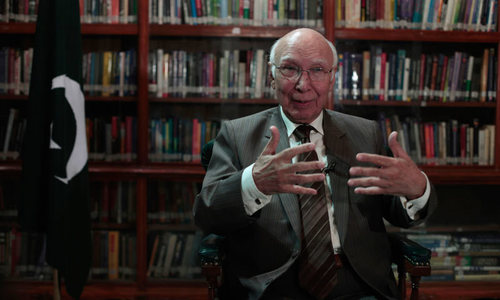WHAT happens when those who aren’t supposed to be conducting foreign policy assert themselves and those who are meant to be doing so meekly surrender?
The case of the so-called India dossiers is an illuminating answer. Last week, the adviser to the prime minister on foreign affairs, Sartaj Aziz, caused a stir in parliament and outside by suggesting that the three dossiers prepared for the yet to be held NSA meeting between Pakistan and India did not contain any “material evidence”.
A day later, Mr Aziz tried to clarify his comments while replying to a question in the National Assembly, but the damage was done — clearly, the federal government is not on the same page as the military leadership when it comes to dossier diplomacy. This is unsurprising. It has not been clear what the dossiers are meant to achieve in the bilateral relationship.
Also read: Dossiers on Indian terrorism have irrefutable evidence, asserts FO
To be sure, there is a strong likelihood that there is a great deal of truth to what has been alleged about Indian involvement in Fata, Khyber Pakhtunkhwa and Karachi.
While the jihad connection and Pakistan’s support for the people of Kashmir has dominated the storyline, there is a long history of India trying to find and exploit security vulnerabilities inside Pakistan.
Even the MQM, which long denied any links between its members and the Indian security establishment, has publicly admitted that some of its cadres have received training in India, though the party said it was not its official policy.
Yet, when the dossiers were compiled to take to the NSA meeting, and then when that meeting was postponed they were shared with the UN secretary general’s office and US secretary of state, what was it meant to achieve?
Surely, the Indian state – its national security adviser no less — is aware of its intelligence apparatus in Afghanistan and Pakistan. Can the state here realistically hope to deter Indian interference inside Pakistan through dossiers? It is unlikely in the extreme.
More likely, the security establishment here is reacting to Indian Prime Minister Narendra Modi’s insistence that talks with Pakistan hew to a one-point agenda – terrorism. Raking up allegations of Indian meddling follows the old tit-for-tat formula that has helped bog down Pakistan-India relations for decades. But what is the alternative?
The civilian government needs to rethink its dealings with the military particularly when it comes to India.
By reluctantly going along with security establishment demands and later showing its disinterest, the PML-N government is unwittingly sending the wrong signal to India too, making it even easier for New Delhi to reject meaningful talks with a lame-duck government in Pakistan. Internal coherence is a prerequisite for strong external projection. The military leadership needs to absorb that lesson too.
Published in Dawn, November 23rd, 2015













































